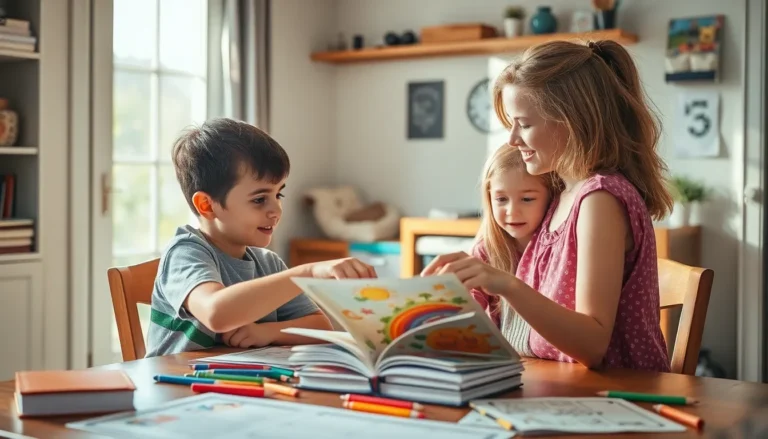Table of Contents
ToggleParenting isn’t a walk in the park; it’s more like a rollercoaster ride with unexpected twists and turns. While some parents master the art of nurturing, others might inadvertently embrace negative parenting styles that can leave their kids feeling like they’re stuck in a never-ending sitcom without a laugh track. From overbearing helicopter parents to the elusive uninvolved ones, these styles can create chaos in a child’s emotional landscape.
Understanding Negative Parenting Styles
Negative parenting styles significantly hinder a child’s development. These approaches include authoritarian, permissive, and uninvolved parenting. Each style manifests distinct behavioral patterns, affecting children’s emotional and psychological health.
Authoritarian parenting emphasizes high demands and low responsiveness. Parents dictate strict rules with little room for discussion or emotional support. Children raised in such environments often experience anxiety and low self-esteem.
Permissive parenting provides a stark contrast. Here, parents display warmth but lack boundaries, resulting in children who struggle with self-discipline and authority. These children often face difficulties in academic settings due to the absence of structure.
Uninvolved parenting presents another problematic style. Characterized by neglect, parents remain detached from their children’s needs and emotions. This lack of engagement can lead to confusion and feelings of unworthiness in children.
Each negative style contributes to long-term challenges for children, including difficulties in forming relationships and managing stress. Identifying these styles is crucial for parents to adopt healthier approaches. Recognizing these patterns enables parents to reflect on their methods and encourages positive change.
Common Types of Negative Parenting Styles
Negative parenting styles can significantly affect a child’s emotional and psychological growth. Understanding these styles helps in recognizing patterns that require change.
Authoritarian Parenting
Authoritarian parenting emphasizes strict control and discipline. Parents set rigid rules and expect obedience without hesitation. Children experience low emotional support in this environment, leading to anxiety and low self-esteem. Studies show that children raised in authoritarian households struggle with decision-making and often lack confidence in social situations. Communication tends to be one-sided, leaving children feeling unheard and misunderstood. Such dynamics can result in rebellion during adolescence as children crave independence.
Permissive Parenting
Permissive parenting stands out due to its warmth and lack of boundaries. Parents adopt a lenient attitude, allowing children to make their own decisions without much guidance. This often leads to difficulties in self-discipline and delayed maturity. Children may struggle to follow rules or feel entitled, as their parents prioritize love over limits. Research indicates that permissive parenting is linked to problems with authority and impulse control. When faced with challenges, these children might lack the coping mechanisms needed for adult life.
Neglectful Parenting
Neglectful parenting involves a lack of attention and emotional support. Parents are often indifferent to their children’s needs, leading to feelings of worthlessness and confusion. Children may experience developmental delays and struggle in forming healthy relationships. Emotional neglect can hinder a child’s ability to trust, affecting future interactions. Studies suggest that individuals raised in neglectful homes often exhibit behavioral issues and low self-esteem. Such patterns demonstrate the importance of active engagement in a child’s life for healthy emotional development.
Impact of Negative Parenting Styles on Children
Negative parenting styles create lasting effects on children’s growth and development. Each style contributes uniquely to emotional and behavioral outcomes.
Emotional Consequences
Children raised in negative environments often experience emotional turmoil. Authoritarian homes, with their strict rules, lead to increased anxiety and diminished self-esteem. Trust issues frequently arise due to lack of emotional support. Permissive parenting can result in entitlement, as children may struggle with boundaries and limits. Neglectful approaches foster feelings of worthlessness which create confusion about self-worth. These children may also experience difficulty in trusting others, impacting future relationships. Overall, the emotional health of children suffers significantly due to negative parenting styles, often resulting in long-term psychological challenges.
Behavioral Consequences
Behavioral issues often stem from negative parenting styles. Kids from authoritarian backgrounds may exhibit rebellion, as they search for independence and control. In contrast, those with permissive parents might struggle with impulse control, showing disrespect for authority and guidelines. Children exposed to neglect might act out, demonstrating aggressive behaviors or withdrawing socially. Developmental delays frequently occur, especially in neglectful scenarios, hindering the development of social skills. Research indicates these behavioral challenges often persist into adulthood, making it crucial to recognize and address negative parenting patterns for healthier outcomes.
Identifying Negative Parenting Styles in Your Own Behaviors
Recognizing negative parenting styles starts with self-reflection. Observing interactions can reveal behaviors resembling authoritarian, permissive, or neglectful approaches. Parents can assess their communication patterns to identify one-sided dialogues that may cause children to feel unheard.
Noticing rigid rules signifies authoritarian tendencies. A strict approach lacks emotional support, fostering anxiety and low self-esteem in children. If parents enforce rules without explaining the rationale, it often leads to confusion and rebellion as children seek independence.
Conversely, permissive parenting emphasizes warmth without boundaries. If parents prioritize love over limits, children may struggle with self-discipline. Delays in maturity become apparent when kids find it difficult to follow rules, cultivating a sense of entitlement.
Neglectful parenting manifests as a lack of attention and emotional support. Parents should reflect on whether they are emotionally available and responsive to their children’s needs. Children raised in neglectful environments experience feelings of worthlessness, hindering their ability to form healthy relationships.
Daily interactions provide valuable insights into parenting styles. Frequent moments of frustration can indicate an overbearing attitude, suggesting the need to adjust approaches. Being conscious of emotional responses helps identify patterns that may require change.
Emphasizing awareness leads to healthier relationships with their children. Parents can cultivate an environment of support by actively listening and engaging. Each style’s impact on a child’s emotional and behavioral development underscores the importance of recognizing these patterns. Adopting positive approaches fosters emotional well-being and encourages growth, paving the way for healthier parenting practices.
Strategies for Overcoming Negative Parenting Styles
Recognizing negative parenting styles serves as the first step toward improvement. Parents need to assess their behavior and its emotional impact on their children. Engaging in open conversations about feelings can foster understanding and build trust. Practicing active listening encourages children to express their emotions more freely, creating a supportive environment.
Implementing consistent routines helps children feel secure and establishes clear expectations. Setting boundaries paired with warmth nurtures a balanced approach, allowing children to thrive. Introducing positive reinforcement for desired behaviors guides children towards self-discipline and responsibility. Encouragement and praise for efforts, not just results, cultivate a growth mindset.
Seeking professional help might also be beneficial. Family therapy provides a neutral space for addressing concerns and reconnecting with children. Regardless of the approach, parents should focus on developing empathy and emotional awareness. They can model healthy coping strategies to help children navigate their own emotions.
Involving children in decision-making fosters independence and self-esteem. Allowing children to voice opinions encourages critical thinking and confidence. Exploring alternatives to difficult situations together can teach problem-solving skills. Sharing experiences and discussing mistakes promotes resilience and adaptability.
Utilizing resources, such as parenting classes or workshops, enhances parenting skills. Educational materials and support groups connect parents who share similar challenges. Focusing on personal growth allows parents to refine their techniques and improve their relationship with their children.
Negative parenting styles can have lasting effects on a child’s emotional and social development. Recognizing these patterns is crucial for parents seeking to improve their approach. By understanding the consequences of authoritarian, permissive, and neglectful parenting, they can take proactive steps to foster healthier relationships with their children.
Implementing positive strategies such as open communication, setting boundaries, and practicing active listening can create a nurturing environment. Ultimately, embracing these changes not only benefits the child but also enriches the parent-child bond, paving the way for a brighter future filled with mutual respect and understanding.







